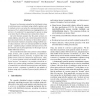Free Online Productivity Tools
i2Speak
i2Symbol
i2OCR
iTex2Img
iWeb2Print
iWeb2Shot
i2Type
iPdf2Split
iPdf2Merge
i2Bopomofo
i2Arabic
i2Style
i2Image
i2PDF
iLatex2Rtf
Sci2ools
ICDCS
2005
IEEE
2005
IEEE
The Impossibility of Boosting Distributed Service Resilience
We prove two theorems saying that no distributed system in which processes coordinate using reliable registers and -resilient services can solve the consensus problem in the presence of ·½undetectable process stopping failures. (A service is -resilient if it is guaranteed to operate as long as no more than of the processes connected to it fail.) Our first theorem assumes that the given services are atomic objects, and allows any connection pattern between processes and services. In contrast, we show that it is possible to boost the resilience of systems solving problems easier than consensus: the -set consensus problem is solvable for ¾ ½failures using ½-resilient consensus services. The first theorem and its proof generalize to the larger class of failure-oblivious services. Our second theorem allows the system to contain failureaware services, such as failure detectors, in addition to failure-oblivious services; however, it requires that each failure-aware service be connec...
Consensus Problem | Distributed And Parallel Computing | ICDCS 2005 | Process Stopping Failures | first Theorem |
| Added | 24 Jun 2010 |
| Updated | 24 Jun 2010 |
| Type | Conference |
| Year | 2005 |
| Where | ICDCS |
| Authors | Paul C. Attie, Rachid Guerraoui, Petr Kouznetsov, Nancy A. Lynch, Sergio Rajsbaum |
Comments (0)

